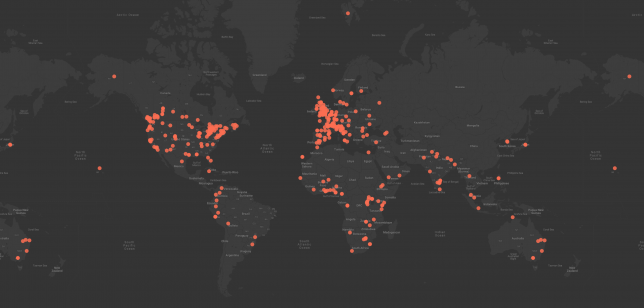 On September 15-17, millions marched around the world demanding an immediate, equitable end to fossil fuels.
On September 15-17, millions marched around the world demanding an immediate, equitable end to fossil fuels.On September 15-17, millions marched around the world demanding an immediate, equitable end to fossil fuels. This global movement peaked with the March to #EndFossilFuels in New York City on September 17, which preludes the first United Nations Climate Ambition Summit on September 20. U.N. Secretary-General António Guterres pressed global leaders to commit to phasing out fossil fuels.
‘Historic mobilisation’: millions around the world join fight against fossil fuels.
— #StopRosebank (@StopCambo) September 17, 2023
650+ actions across the globe to demand a rapid, just, and equitable end to fossil fuels. #EndFossilFuelspic.twitter.com/SbC3e9gIop
The backdrop for these mobilizations is the intensifying climate crisis, evidenced by recent extreme heatwaves, floods, and severe weather events. As the climate threat grows, so does the worldwide movement for climate justice. These initiatives oppose the fossil fuel industry and its proponents, calling for swift transitions to greener alternatives. They called for a just transition to a renewable energy future that generates millions of jobs while supporting workers’ and community rights, job security, and employment equity.
#EndFossilFuels
— DRUM #MayorDefundedOurSchools (@DesisRisingUp) September 17, 2023
We want climate justice and reparations for all our people!
Global South Diaspora contingent takes to the streets! pic.twitter.com/cNtSI0EHp8
World Leaders, #EndFossilFuels & #GoGreen 🚨
— Save Future Bangladesh 🇧🇩 (@SaveFutureBd) September 15, 2023
We Want #ClimateJustice, #ClimateAction & #ClimateReparations ‼️#GobalClimateStrike#Dhaka, #Bangladesh 🇧🇩#ClimateStrike #FridaysForFuture#SaveFutureBangladesh pic.twitter.com/79geoazsEg
Over 20,000 demonstrators took to the streets in Manhattan, including a 50-member delegation from New Mexico comprising Indigenous, environmental, youth, and frontline advocates. New Mexico, the second-largest oil producer in the U.S., has witnessed the country’s most significant oil production growth in the past three years. Bernal, Pueblo Action Alliance’s executive director, highlighted the collaboration of New Mexican grassroots movements with global initiatives. Their shared objective is to spotlight the financial exploitation and commodification of natural and cultural assets, demanding that leaders pursue genuine climate action, void of the damaging extraction that has marred their ancestral lands for centuries.
New Mexican representatives also presented a grassroots climate justice declaration to global, national, and state leaders. Supported by over 20 Indigenous and environmental entities, it lists imperative actions that are needed now to ensure a sustainable future. The demands encompass an end to new fossil fuel initiatives, immediate fossil fuel phase-outs, rejecting unproven solutions, emphasizing Indigenous ecological wisdom, and declaring a climate emergency to facilitate a fair transition.
Fridays for Future NYC, a youth-led climate activist group, mobilized high school students for the event. Despite juggling school, SATs, and college applications, these young activists dedicated their summer to organizing, recruiting hub captains from various schools, and expanding youth turnout. Even with the vast coalition for the march, Fridays for Future NYC focused on its community-based approach, ensuring young voices were heard.
The NYC March was supported by 500 organizations, including the NAACP, Sierra Club, the Sunrise Movement, the Center for Biological Diversity, Center for Popular Democracy, Climate Organizing Hub, Food & Water Watch, Fridays For Future USA & NYC, Earthworks, Greenfaith, Indigenous Environmental Network, New York Communities for Change, Oil Change International, and Oil & Gas Action Network.
Huge thanks to everyone who showed up today, over 50,000 marching through the streets of NYC. This the beautiful movement that will #EndFossilFuels! pic.twitter.com/B3N5D8ZqGf
— Food & Water Watch New York (@FWWNewYork) September 17, 2023
The climate crisis is urgent, and we cannot afford to wait any longer. We must take action now to end fossil fuels and build a just and sustainable future. Join the movement for climate justice, and let your voice be heard.


